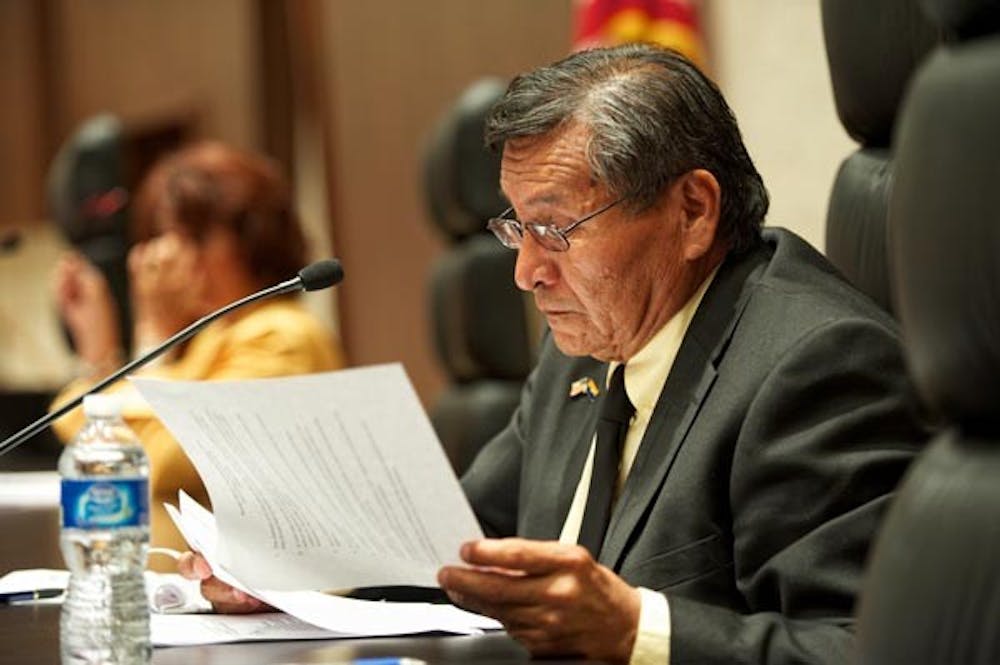Corrections added.
Navajo Nation presidential candidates discussed jobs, infrastructure and natural resources at a Tempe campus debate Monday night.
Ben Shelly, the current Navajo Nation vice president, and his opponent Lynda Lovejoy, a New Mexico state senator, debated in front of a packed auditorium in Armstrong Hall of the Sandra Day O’Connor College of Law.
Shelly said during his opening speech that coming to ASU for the debate made him see the struggle students face with high tuition, lodging and parking.
“I thought I was proud to say that we were putting forward a lot of money in Navajo Nation scholarships,” Shelly said. “I never felt you were in this bad of a shape, but I see it now that you do need help from us.”
Lovejoy said she too has seen the difficulties students are experiencing.
“You have a dream but you’re struggling to make ends meet,” Lovejoy said. “You’re going to school, you’re working part time, and it’s hard.”
The event was sponsored by the ASU Student Committee for Navajo Nation Presidential Debate, which held its first debate at ASU during the 2006 election.
The Navajo Nation spans across three states and includes more than 17,000 members in Maricopa County. The Nation has a presidential election every four years.
Panelist Victor Begay, formerly with ASU’s Center for Indian Education, asked the candidates what they would do to encourage Navajo youth to return to the reservation to seek employment after they graduate from college.
Lovejoy said there are a lot of vacancies within the Navajo Nation that remain empty because they are so difficult to fill.
“Turn those empty jobs into internship programs to tap into graduates at bachelor and graduate levels so they can gain experience in those areas,” she said.
Shelly said creating jobs is a priority.
“Early retirement is allowed to our employees to make room for the young Navajo looking for jobs,” he said.
Begay also asked about the proposed Desert Rock power plant to be built in New Mexico, which would be the fourth of three similar power plants, all within 25 miles of each other.
“It’s a coal-fired power plant, it’s the last thing we need, and it would draw water out of our local water table,” Begay said during a break in the debate of what opponents to the plant are arguing. “Others say it will bring jobs and revenue to the reservation, which is really badly needed.”
He said people living in the area don’t want it built, but government officials are in favor of it.
Shelly said he had been a supporter of the plant for 19 years, but is now very much against it. He went out to the proposed building site and said the pollution was obvious.
“Sit out there for an hour and then wipe your hand across your car,” he said. “I did, and it was black.”
Lovejoy said the tribe had already spent so much money trying to develop the plant at Desert Rock.
“There are alternatives, and if there are alternatives that meet the needs to develop something else at that location that will not pollute our land and our water, we will certainly support [it],” she said.
Candidates also talked about the Northeastern Arizona Indian Water Rights Settlement, a controversial proposal “that does take water rights from our people,” said Jolyana Begay-Bitsuie, an ASU Navajo language instructor.
The settlement deals with settling “water rights claims between the Navajo Nation and Hopi Tribe,” and was tabled in on Sept. 29, according to a Navajo Nation Council press release.
“There’s not much information on the topic and in a sense, people are panicking,” she said of her question during a break in the debate. “At the council level, they’re not informing us.”
Both candidates said they would work to improve the level of education among Navajo Nation residents so they understand what the proposal would do.
Interdisciplinary studies senior Randy Curley, a committee member part of the student group that sponsored the event, moderated the debate and said it was important for people to stay connected to the politics of the Nation, even when they live in urban areas.
“Even though we are far from home, it is still home. What happens there affects us here,” he said.
The Phoenix Indian Center is hosting absentee voting Oct. 22 and 23 at the Phoenix Indian Center.
Reach the reporter at ymgonzal@asu.edu
Want to get the latest ASU news in your inbox every day? Sign up for our new e-mail newsletter.





